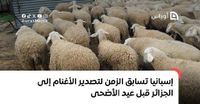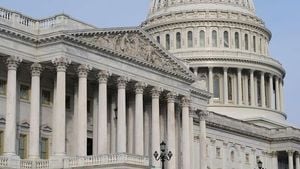Moroccan media outlets have voiced concerns among livestock breeders and exporters in both Morocco and Spain following a significant decision by the Moroccan Kingdom. In a decree issued by King Mohammed VI, the country will not allow the slaughtering of sheep for Eid al-Adha this year, a move aimed at preserving the national herd and protecting animal wealth.
In previous years, the Moroccan Kingdom had relied heavily on Spanish livestock imports, particularly during the Eid al-Adha celebrations, due to rising prices and meat shortages. However, the recent ban has made this practice impossible. As a result, Spain is now shifting its focus to the Algerian market for its sheep exports, a strategy that has reportedly been discussed with the Ministry of Fisheries.
According to the organization 'Asaja Extremadura,' which represents over 5,000 livestock and sheep breeders, there is an urgent need for the Spanish Ministry of Agriculture, Fisheries, and Food to intervene. They are advocating for measures that would facilitate the export of Spanish sheep to Algeria, aiming to improve and expand trade agreements with the North African country. The organization stresses the necessity of diversifying export destinations, especially given the challenges faced in traditional markets like Morocco.
Raul Muñoz, president of the Interovic professional organization for lamb and beef, stated that the Spanish livestock sector is hopeful about resuming live sheep exports to Morocco, despite the royal directive against this year’s Eid al-Adha sacrifices. He admitted that the king's directive was unexpected and has led to a complete halt of shipments to Morocco, which typically receives between 10,000 and 15,000 heads of sheep weekly, either for consumption during Ramadan or to prepare for Eid al-Adha.
Each year, Morocco slaughters approximately four to five million heads of livestock during the Eid al-Adha celebrations. King Mohammed VI had addressed the nation in February 2025, urging citizens not to carry out the Eid al-Adha rituals this year due to climatic and economic challenges that have adversely affected the national herd.
In a related development, a Spanish organization specializing in livestock breeding and marketing has called on the Spanish Ministry of Agriculture to expedite measures for exporting sheep to Algeria as Eid al-Adha approaches. Mustapha Zebbdi, head of the Algerian organization for consumer protection, confirmed that the Spanish organization comprises about 5,000 sheep breeders.
The Spanish authorities are working to hasten the issuance of general health certificates (ASE) for livestock, which are crucial for initiating the export process to Algeria. Historically, Morocco has depended on importing sheep from Spain to fulfill its meat requirements during Eid al-Adha.
However, King Mohammed VI's recent decision to suspend the Eid al-Adha celebrations has had a dramatic impact on Morocco's livestock imports. The king cited climatic and economic conditions affecting the agricultural sector as the reasons behind this decision, which has resulted in a significant drop in the number of sheep available in the country.
This ban has led to a complete cessation of all shipments destined for Morocco, which previously imported between 10,000 and 15,000 sheep weekly for consumption or preparation for the holiday. Meanwhile, Algerian President Abdelmadjid Tebboune has approved the importation of one million sheep in preparation for Eid al-Adha, as discussed in an extraordinary meeting of the Council of Ministers.
President Tebboune has expressed his disapproval of the rising prices of local sheep, deeming it unacceptable in a country rich in livestock resources. He has also announced strict measures against anyone selling sheep for slaughter, emphasizing the importance of preserving the national herd for future generations.
Additionally, President Tebboune has directed the importation of livestock from several African nations, including Niger and Mali, which are considered key suppliers of livestock in the region.
As the situation develops, both Spanish and Moroccan livestock sectors are navigating uncharted waters. The Spanish livestock industry is eager to find new markets and opportunities, while Morocco grapples with the implications of its royal directive on its annual traditions and meat supply.
The tension between maintaining animal welfare and fulfilling cultural practices like Eid al-Adha is palpable. With the Moroccan decision impacting both local and international markets, the repercussions of this decree will be felt across the region. The Spanish livestock sector is now looking towards Algeria, hoping to establish new trade routes and maintain their livelihoods amidst shifting market dynamics.
As Eid al-Adha approaches, the future of sheep exports from Spain to Morocco hangs in the balance, with both countries adapting to new realities in their agricultural and economic landscapes.





